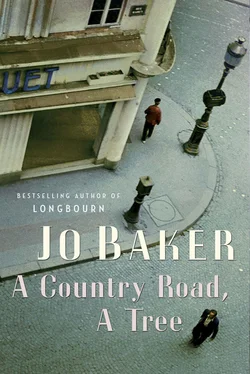“But what will we do?”
She hands the letter back to him. “Look at you. Like a dog that’s had its bollocks cut. I’m not going to Ireland with you, not like that.”
—
Pétain delivers his quavering speeches to the nation over the radio waves and he is not to be believed. But still, the news from Paris, when it trickles in from other sources, from friends of friends and newcomers in town, is not so terrible after all. The city seems to have fallen softly: it’s occupied, but it hasn’t been destroyed. The government has graciously stepped back and ushered the invaders in, and little material damage has been done to the capital. There have been skirmishes in the streets, but as yet there have been no massacres. Cafés and cinemas and shops are reopening already; the Opéra is lit up again. There is still wine to be drunk and dinner to be eaten and films to be seen, if you have the money and if you can stomach the company. They come and go as they please, the occupiers, cameras dangling round their necks, gawping at the sights, cluttering up the place, buying knick-knacks. If you can live with that, then you can live in Paris; you can live in what has become a resort town of the Reich.
It’s worth a try, isn’t it? It will still be Paris, won’t it? More or less.
CHAPTER SIX PARIS, Winter 1940
The spine of a small fish lies picked quite clean between them. Suzanne is busy with the décorticage of the fish’s head: her slender, quick fingers and little knife pick the flesh from the cheeks, then tease out the eyes and brain. Capable. That’s what he thinks. She is so capable. He is lucky that she is.
“I’m sorry,” he says.
She gathers the bits together, then presses and smears them on to two coins of bread.
He has his papers at last. He has his letter of certification. The return to Paris has enabled this much. His presence in France is now legitimate; he is allowed to stay. The fact of the occupation seems to have finally added a degree of efficiency to the Legation’s work, which the mere threat of invasion never did. He is entitled to the same rations as any French citizen. So he has his fourteen ounces of bread a day. These two pieces are the last of it. They are a reminder of three hours of queuing, with a book in hand, shifting his weight from foot to foot. Trying not to think of cigarettes. Of which there is a dearth.
She hands a disc of bread to him.
“Is there anything we can do?” he asks.
She pulls her bread apart now, having so carefully assembled it. “I don’t know.”
They have twelve ounces of coffee a month. Twelve ounces is not even close to enough, not even for a week. Twelve ounces cannot in any reasonable way be made to stretch to a month. He is in constant want of coffee. The headaches are blinding.
“Do you want to go down to the Commissariat and ask?”
She breaks a fragment of crust in two, and slips one half between her lips.
“We could just ask.” He bites, and carefully chews, and an eyeball pops between his back teeth and he tastes salt. “If they know people know that he is there, and are concerned about him, it might help.”
“You think they would treat him more kindly?”
“Maybe.”
“Maybe I will, then.” After a moment: “I see you’ve been reading that dreadful stuff again.”
His copy of Mein Kampf lies face-down, splayed out upon the table. He does not usually treat his books like this.
“I don’t know how you can bear it,” she says.
He swallows carefully, licks his lips. “It’s important.”
“It’s dreadful.”
“Yes, but it is important.”
These words have redrawn the map of Europe, they have leached out the different colours of the world. They have sucked up rights and liberties. These words kill. The world is different because of them.
“But does it help?”
“I don’t know if it helps. ”
She teases her bread into crumbs, her lips twisted. To choose a word is to force feeling into shape. To speak that word is to hand that feeling and that shape over, and watch the other person turn it round and find colours and contours of which one had not been aware. And that is what Suzanne is struggling with now. Because these feelings do not have an easy fit with words, they are ugly and clumsy, like phlegm in the throat. Language becomes a fumble, a blunder, sputtering. It fails her.
Because a friend of hers, someone she’s known since she studied with him as a youngster at the Conservatoire, has gone. Just gone. She found the flat empty and the door sealed and the neighbours twitchy and boggle-eyed in their doorways, wanting the conversation over and the door shut and her gone. No, they didn’t have a clue why he was taken; no, there was no sense to be made of it at all; such a sweet man, such a gentle soul, never a moment’s trouble from him and they’ve been neighbours for a decade. No, it was not the Germans; it was the French police.
Her friend was a communist. That’s all that she can imagine that they had on him. They are awkward things to carry round with you these days, principles.
And her friend is not alone in his disappearance.
Old Monsieur Lunel also seems to have dropped out of existence. First the yellow sign went up on his draper’s shop. That itself wouldn’t stop his regular customers from shopping there, but the Boche, the Green Beans, were the only ones with any money, so it hardly mattered if anybody else wanted to do business with him. Then one day the place just didn’t open, and then there were new managers, and the yellow sign came down, and nobody knows where Monsieur Lunel went, who used to make such a pet of Suzanne, who’d throw in thread and tape gratis when his wife’s back was turned. Whose daughters would chat with her, would shake their heads and laugh at the old man’s flirting. Whose grandchildren would learn their spellings behind the shop counter, would use buttons as counters to do their sums. Nobody knows where any of them went.
She still hopes it could be a magic trick of their own devising. A disappearing act.
“That graffiti is disgusting,” she says. “Did you see?” There’s a deep line between her brows.
“At the Lunels’?” he asks.
She raises a shoulder. “They’re scrubbing it off. The new people. Do you think you could put that away while we’re eating?” She flaps a hand towards the German book. “Or, better, chuck it out. Throw the damned thing on the fire. It gives me the shivers.”
He closes it.
“I don’t know how you can stomach it at all.”
He pushes it aside.
“I hate it. It makes me sick.”
She shoves it off the table. It tumbles, lands with a thud on the boards, pages fluttering.
He leans over to pick it up.
“I’m living on my nerves here,” she says. He straightens with the book. “I’m living on my nerves and you’re acting as though everything’s normal, as though it’s nothing, as though there’s nothing to be said.”
He closes the book, gets up and shelves it. “Not at all.”
She glares at him. Then she stands up and stalks to the door and shrugs herself into her coat.
“You’re impossible,” she says.
She claps the door shut behind her, clatters down the stairs.
He picks up the plates and takes them to the little pantry to be washed. He could have said, perhaps, that he is trying; to get a fingernail into this, to get a foothold.
—
It is a brutal winter. The wind cuts to the core and whips snow.
Shortages are sudden and hard and unpredictable: one day there is no milk to be had, another there are no matches; he goes to buy razorblades and it turns into a tour of the quarter’s pharmacies: he finally gets hold of them in a drab little corner shop near Saint-Sulpice. Coffee becomes available again, but it’s a ghost of what it was; it’s no longer made of coffee beans, but roasted barley corns. The butcher’s shop closes at noon, because there’s nothing left; the meaner cuts are now expensive, but they disappear as quickly as the steak, since they’re still off the ration and so can be simply bought. The shelves in the épicerie are empty. Rationing quite quickly becomes abstract: it doesn’t really matter what your share of nothing is.
Читать дальше










